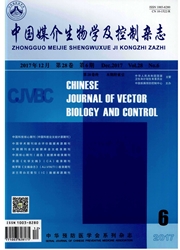

 中文摘要:
中文摘要:
蚊虫抗药性机制的研究对抗药性监测、治理及新的卫生杀虫剂研制具有重要意义。现已对与蚊虫杀虫剂抗性的相关行为、生理代谢活动及作用靶标等进行了全面研究。目前证实蚊虫抗药性与行为、生理功能改变、解毒功能增强和靶标不敏感性等有关。近年来,随着分子生物学、基因组学以及遗传学的发展,蚊虫抗药性的分子机制有了新的研究进展,已发现并克隆了一些靶标基因,与抗药性相关的基因突变也得到普遍验证。该文综述了蚊虫的抗药性机制在分子生物学水平的研究进展,重点阐述了与蚊虫抗药性相关基因的扩增、表达及基因结构的改变等。
 英文摘要:
英文摘要:
Studies on the mechanisms of insecticide resistance is very important to develop effective strategies for monitoring and managing insecticide resistance as well as new pesticide research. In the past several decades, a great deal of studies on insecticide resistance mechanisms, such as behavior, physiological function, metabolic action and target-site have been reported. It has been proven correct that mechanisms of insecticide resistance were confirmed by changed behavior, modified physiological function, enhanced detoxification and target-site insensitivity. Recently, with the development of the molecular biology, insect genomes and genetics, the molecular mechanism of insect resistance has been elucidated to much greater details. Some target genes have been identified and cloned in many mosquitoes. Some insecticide resistance related mutations have been screened out in some mosquitoes. This paper reviewed the progress in molecular mechanisms of mosquito resistance to insecticides. The alterations in genes related to insecticide resistance including amplification, over-expression and structure change were introduced in details.
 同期刊论文项目
同期刊论文项目
 同项目期刊论文
同项目期刊论文
 期刊信息
期刊信息
